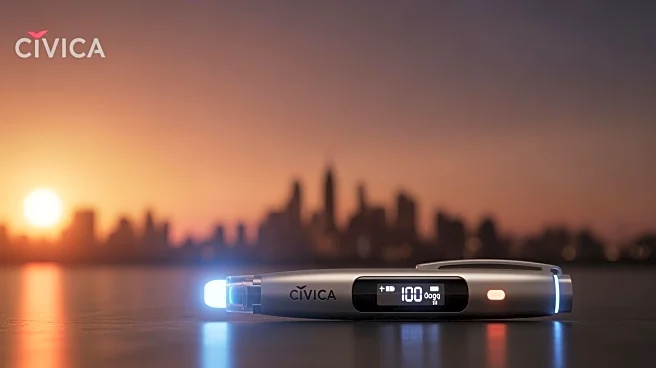What's Happening?
Civica, a non-profit pharmaceutical company, is set to launch an affordable long-acting insulin, insulin glargine-yfgn, in the United States starting January 1, 2026. The insulin will be available in pre-filled
pens at the lowest list price in the current market, with a recommended consumer price of no more than $55 for a box of five pens. This initiative aims to provide a transparent pricing model without hidden rebates, addressing the high costs that often force patients to skip doses or take less than prescribed. Civica's insulin glargine is interchangeable with Lantus and will be manufactured by Biocon Biologics under its existing U.S. marketing approval.
Why It's Important?
The launch of Civica's insulin glargine represents a significant step in addressing the prescription drug affordability crisis in the U.S. By offering insulin at a stable, low price, Civica aims to improve access for patients who struggle with high medication costs. This initiative is particularly important for the millions of Americans living with diabetes, as it provides a more affordable option for managing their condition. The partnership with Biocon Biologics also highlights the role of non-profit organizations in stabilizing the drug supply chain and reducing shortages, ultimately benefiting patients and healthcare providers.
What's Next?
As Civica prepares to launch its insulin glargine in January 2026, stakeholders will be closely monitoring the impact on insulin prices and accessibility. The success of this initiative could lead to further collaborations aimed at addressing drug affordability challenges. Healthcare providers, patients, and policymakers may also consider the implications of Civica's transparent pricing model, potentially influencing future regulatory policies. Additionally, the partnership with Biocon Biologics may pave the way for similar initiatives in the pharmaceutical industry, focusing on essential medicines for chronic conditions.
Beyond the Headlines
Civica's approach to pricing transparency and affordability reflects a broader trend towards ethical practices in the pharmaceutical industry. By eliminating hidden costs and providing a stable price, Civica is setting a precedent for fair pricing models that prioritize patient welfare. This initiative also underscores the importance of strategic partnerships in expanding access to healthcare, particularly for vulnerable populations. As the industry continues to evolve, such efforts may influence regulatory policies and encourage more companies to adopt similar approaches.









